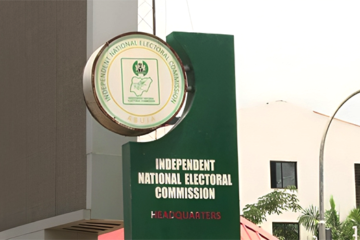Erisco vs Egodi: The police is the villain [OPINION]

Abimbola Adelakun
By Abimbola Adelakun
Here is what happens every single time a Nigerian “big man” and the common man enter a contest of wills: the ethically bereft Nigerian police is more than likely to fight the battles of the rich and powerful than to side with justice or even common sense. We saw that happen in the case of Mrs Aisha Buhari, who was enraged when a random guy on Twitter body-shamed her. We have also seen instances when Christian and Muslim clerics (this column has addressed several cases) use their almighty influence with the police to arrest and detain people over what should have been treated as mere civil cases.
Recently, the police arrested 25 women who were protesting hardship and hunger in Niger State. You wonder, do the issues against which these women are publicly demonstrating not affect even those officers? The police officers are suffering along with millions of Nigerians, yet their response to the protesters of a joint cause was aggression.
Yes, their stated reason for arresting those women was that they attacked the police. Now, it is not only unbelievable that women ranging between 30 and late 50s would “turn violent” against the police, I also find it quite laughable that the police’s report of the “dangerous weapons” on these women—and this is quoting directly from the police statement—are “a bench and a stick used as barricade, three knives, one scissors, one cutlass, one saw blade, one iron pipe, four other sticks, two wraps of Indian hemp, charms, etc.”
Reading that, you question whether those women were truly arrested because they threatened the officers with “dangerous weapons,” or that their public demonstration exploded the political establishment’s insistence that all is well within the country.
The singer Davido frequently shares a disturbing story about his billionaire father using the police to arrest his people to dissuade him from taking up a singing career. It is telling that we live in a jungle when a father uses supposed instruments of justice to oppress people going about their way just to discipline his own son. When a society gets to the point where accounts of outright power abuse like that are narrated without moral compunction, and the media too reports it as entertainment, then you know how much the people lack a sense of justice.
The same impunity is playing out in the ongoing case of Chioma Egodi who wrote a review of a tomato, and the CEO of the company producing the item Eric Umeofia who was slighted by her temerity enough to use the police to hound her. The high-handedness of the police makes you wonder what exactly is in it for them that they turned themselves into the villains in this story. Had the case not involved a big man, would they have deployed so many resources over it?
If the Nigerian police had a sense of justice or even proportion, they would simply have encouraged Umeofia to pursue a civil case. By running the big man’s errands against a fellow Nigerian, they leave you no doubt which God they truly serve. The way they arrested Egodi, transferred her to the FCT, detained her, and later maintained a standoff at her apartment for over 10 hours, you would think they were dealing with a case of terrorism. Our police (including other security agencies like the DSS) can be unethical. Their professional instincts are too raw; their uncultured self constantly grates the refined surface of democracy.
As for those who suggest Egodi should apologise to Umeofia so the case can die, I hope you have thought through what you are encouraging.
First, given our kind of society, we must always be mindful that certain resolutions create precedents. Ours is a country where inept politicians, forever seeking to distract attention from their serial failures, blame social media for all the vices in the land. If you make the mistake of justifying someone’s oppression because of their social media posts, you may be loading the very weapon that the likes of Femi Gbajabiamila—one of those seeking means to launch a malicious social media agenda regulation—will one day put to your head. A case like this will be their reference point on how far they can go to beat down anyone who ruffles their small feathers. And please, do not think anyone is immune from such oppressiveness. Who would have imagined that the police would one day go crazy over a tomato review?
Second, Umeofia does not seem like the kind of person with whom anyone can reason. In his interview with Arise TV, he swore he would rather die than be persuaded to give up his pursuit of Egodi. One cannot but wonder how bored a CEO must be when he has time and ego to commit to such a trivial matter. A more discreet response to Egodi and the matter would have been long dissolved in one of the endless chatters that flow through social media every moment. In any case, my earnest plea to Umeofia is for him not to die. We need him to live so his intransigence can become a metaphor. His fly that listens to no adviser will end up as a social media meme.
As for the ‘both-sideists’ waiting for me to chide Egodi, please know I do not think she did anything wrong. Yeah, this is merely a needless literalisation of an everyday expression. Even if she had used the word “killing” as the man inferred from her Facebook post, taking it as murdering people is merely an overinterpretation. We frequently use the word “kill” in contexts that have little or nothing to do with literal deaths. When we say, “Lagos traffic is killing people,” does that mean they are dropping dead on the highway? Some of us grew up with parents who, in moments of exasperation, shout, “You this child will kuku not kill me!” Were they talking about actual deaths? The famous Fugees song, “Killing me softly,” was it about murder?
Listening to the people overstretching the meaning of Egodi’s Facebook post just to defend police abuse, you wonder if this is a matter of half-education or just another instance of the Nigerian habit of siding with power. The average Nigerian fetishises power so much that our people will argue against their own best interests. Our police, I admit, is a reflection of our social orientation.
For the rest of us, the proper course of action is to donate money toward Ms Egodi’s legal funds. If you believe in justice and democracy, then please support her case through the courts. No one contests that Umeofia has the right to pursue his case even all the way through to the Supreme Court. Let the courts be the ones to determine that we no longer have rights, not the police playing a villainous role in the whole matter. They should stand down all the muscular displays and treat this as if the two people involved in the case are social equals.
We do not need to like Ms Egodi or her opinions but supporting her right to free speech is a moral duty. When Nigeria gets to the point that we can no longer express ourselves because some high-on-power police officers are going to come barging through our doors, then we might as well have returned to living under military rule. No, this is democracy; we should be free to explore the bounds of our freedom. Nigeria’s democracy might not have done much for us in terms of citizenship, but we still have free speech. The messengers of darkness cannot degenerate our economy, politics, and values and still deny us rights. On this, we must maintain our stand on the resolute ground of principle.
Culled from The Punch











